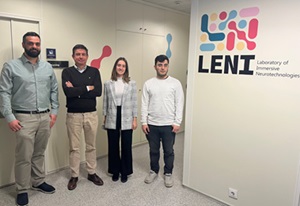REMDE and DEBIO projects
The UPV demonstrates the usability of virtual humans on their way to automatic recognition of depressive symptoms
[ 13/03/2024 ]
Worldwide, 264 million people suffer from depression, an illness that in Spain, where common mental disorders account for 2.2% of GDP, is the leading cause of disability attributed to a single disease. Early detection and subsequent monitoring are essential to combat it, but its diagnosis faces two major problems today: the absence of objective measures and the current overload on public health.
To try to mitigate them, and take advantage of the latest advances in artificial intelligence (AI) in terms of natural language processing and computer graphics, the LabLENI of the Universitat Politècnica de València (UPV), which has been working for years on the generation of virtual humans, is carrying out two joint projects, REMDE and DEBIO - funded respectively by the UPV and the Ministry of Social Rights and Agenda 2030 - which aim to develop a virtual reality application that allows the early detection of depressive symptoms through gaze and voice biomarkers during interactions with virtual humans (DEBIO) and, along the same lines, to study neurophysiological biomarkers in greater depth (REMDE).
Virtual humans as a means of stimulation for recreating realistic conversations
"The general origin of the project," explains Mariano Alcañiz, director of LabLENI (Human Tech UPV) and principal Researcher at DEBIO, "is, through a new technology such as virtual humans, to improve the tools that we make available to mental health clinicians, so that they can carry out a more accurate and rapid diagnosis, in general, of mental health disorders, and specifically, of depression disorders". This is one of the objectives of the recently approved Mental Health and Addictions Plan (2024-2027) of the Generalitat Valenciana.
Specifically, as Javier Marín, Academic Staff of the Applied Statistics and Operational Research, and Quality Department, member of LabLENI and principal Researcher of REMDE, points out, "we are working on the creation of virtual humans that stimulate subjects with conversations in realistic situations, so that, through these conversations, certain biomarkers, behavioural or neurophysiological, can appear that allow us to distinguish people with depressive symptoms from those who do not have them".
"Once the behaviour and responses of the subjects during the conversations have been measured," Marín continues, "the second part of the project consists of modelling the patterns through automatic learning and thus being able to recognise these symptoms automatically.
Validated prototype
To validate the virtual human prototype, the Research team - made up of José Llanes, Lucía Gómez, Alberto Altozano, Eleonora Minissi, Francesca Mura, Jose Roda and Carmen Calero together with Mariano Alcañiz and Javier Marín - experimented with 100 people, half of whom had depressive symptoms.
"The prototype has passed an initial technical validation, testing its usability," says Marín. "It has been confirmed that the conversations have a high degree of realism and naturalness, and are capable of modulating the subjects' emotions," adds the Researcher from the University Institute for Research in Human-Centred Technologies UPV. The results have been published in the scientific journal Expert System with Applications.
Preliminary results of the biomarkers
The UPV team is now working on modelling the biomarkers. In this sense, the preliminary results published at the International Conference on Affective Computing and Intelligent Interaction, held at the Massachusetts Institute of Technology (Boston, USA), says Marín, "indicate that subjects with depressive symptoms presented eye patterns with shorter blinks and longer saccadic movements - rapid eye movements between two fixation points - as well as forward and backward movements, possibly related to greater stress, in addition to avoidance of eye contact".
"At the speech level," he continues, "participants with depressive symptoms used more words associated with denial and exclusion, and referred more to negative emotions. Also, at the neurophysiological level, they showed less sympathetic activity - noted about heart rate variability - and electrodermal activity.
Finally, among the next steps in the research, in the coming months the prototype will be validated with a clinical sample in collaboration with Yolanda Cañada and Luis Miguel Rojo, from the Hospital Universitario y Politécnico la Fe, and Jon Iñaki Etxeandia, from the Hospital Clínico Universitario de Valencia.
"In short," concludes Marín, "these are reliable, objectifiable and standardisable bioinformatics tools that can be of great help in the early detection of affective disorders and their subsequent monitoring to reduce relapses.
Outstanding news
 ARWU 2023
ARWU 2023
The Shanghai ranking reaffirms the UPV as the best polytechnic in Spain for yet another year
 Science Meets Regions CV 2023
Science Meets Regions CV 2023
The UPV and the Almussafes City Council begin a collaboration in search of solutions to maintain the automobile sector in the Valencia Region
 Scientific reference
Scientific reference
Avelino Corma, Distinguished Research Assistant at the UPV, awarded an Honorary Doctorate by the University of Huelva
 Micronanofabs NTC UPV-PERTE CHIP Conference
Micronanofabs NTC UPV-PERTE CHIP Conference
María Marced, TSMC Europe president: "The sector's future is bright, the market is expected to double by 2030"
 Goya nomination
Goya nomination
Javier Polo, who holds a degree in Audiovisual Communication from the UPV, directs the successful short documentary Una terapia de mierda
 Sant Carles Medal 2023
Sant Carles Medal 2023
The Faculty of Fine Arts of the UPV awards the Sant Carles Medal 2023 to outstanding Valencian art and culture figures







